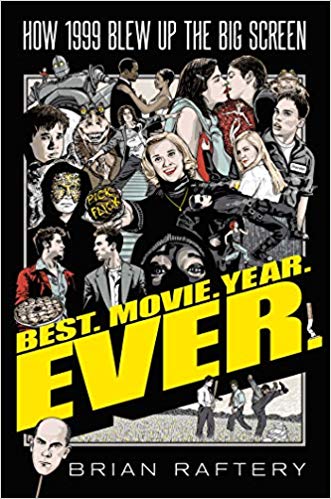 By BRIAN RAFTERY (Simon & Schuster; 2019)
By BRIAN RAFTERY (Simon & Schuster; 2019)
Yes, that title is serious: author Brian Raftery really believes 1999 was the “best” movie year ever. To be sure, ‘99 did contain a number of groundbreaking flicks — FIGHT CLUB, THE MATRIX, ELECTION, BEING JOHN MAKOVICH and overall was a strong year for cinema, but the “most unruly, influential, and unrepentantly pleasurable film year of all time”? I beg to differ!
This book, at least, has undeniable nostalgia value for those who recall the major events of ‘99. The Columbine shootings and their immediate aftermath are covered here, as is the ascension of Ain’t It Cool News and the nonevent that was the Y2K bug many believed would short out computers when clocks around the world changed to 2000 (long story short: it didn’t).
This book, at least, has undeniable nostalgia value for those who recall the major events of ‘99.
As for the major movies of the year, they’re nearly all covered here, including the abovementioned groundbreakers and THE BLAIR WITCH PROJECT, THE SIXTH SENSE, EYES WIDE SHUT, THREE KINGS, BOYS DON’T CRY, THE IRON GIANT, GO and THE PHANTOM MENACE. Most of the info in these pages has already been aired elsewhere (in books like DOWN AND DIRTY PICTURES and REBELS ON THE BACKOT, and innumerable DVD commentaries), but there are some fun never-before-divulged tidbits to be found. They include an elaborate Y2K-themed joke perpetrated by FIGHT CLUB’S major players Brad Pitt and David Fincher on New Year’s Eve of 1999, and also a recollection by MAGNOLIA’S Paul Thomas Anderson about a lunch meeting with Warren Betty that Anderson insisted by held in a “really brightly lit” place where “everyone will see I’m having dinner with Warren Beatty.”
…fun never-before-divulged tidbits to be found.
In trying to justify his thesis Raftery naturally overrates many of the movies under discussion. I strongly disagree with the statement that “To the teens and preteens who came of age in the late nineties, films such as 10 THINGS I HATE ABOUT YOU and SHE’S ALL THAT are as beloved as THE BREAKFAST CLUB and THE KARATE KID were to the generation before,” and also the deification of MAGNOLIA, apparently the “movie-ist movie of the year.” Raftery even jumps on the pro-Jar Jar Binks bandwagon that has sprung up recently by featuring extensive interviews with actor Ahmed Best, who played that much despised character.
In fairness, Raftery is quite dismissive about certain 1999 movie releases. Many important films from that year are left undiscussed, such as THE GREEN MILE, which is dismissed as a “pokey Tom Hanks prison drama,” and Spike Lee’s SUMMER OF SAM, whose sole mention in these pages is in a single non-committal sentence.
For all his reverence for 1999, Raftery is careful to adhere to current standards of political correctness. He makes sure to apologize profusely for using the “terminology of the time” about LGBTQ identity in the BOYS DON’T CRY chapter, a major part of which is taken up with queries about the precise nature of the sexuality of its protagonist: “Was Brandon a lesbian who was lying to the community? Was Brandon trans? We wanted to get to the truth of this person and his experience.” Raftery also gets into potential trouble in properly codifying THE MATRIX’S Wachowski siblings, who are identified by their current monikers Lilly and Lana, even though they were known, and credited, as Andy and Larry back in 1999. With such backward attitudes it’s clear that the year, despite the author’s inflated claims, wasn’t all that great.
